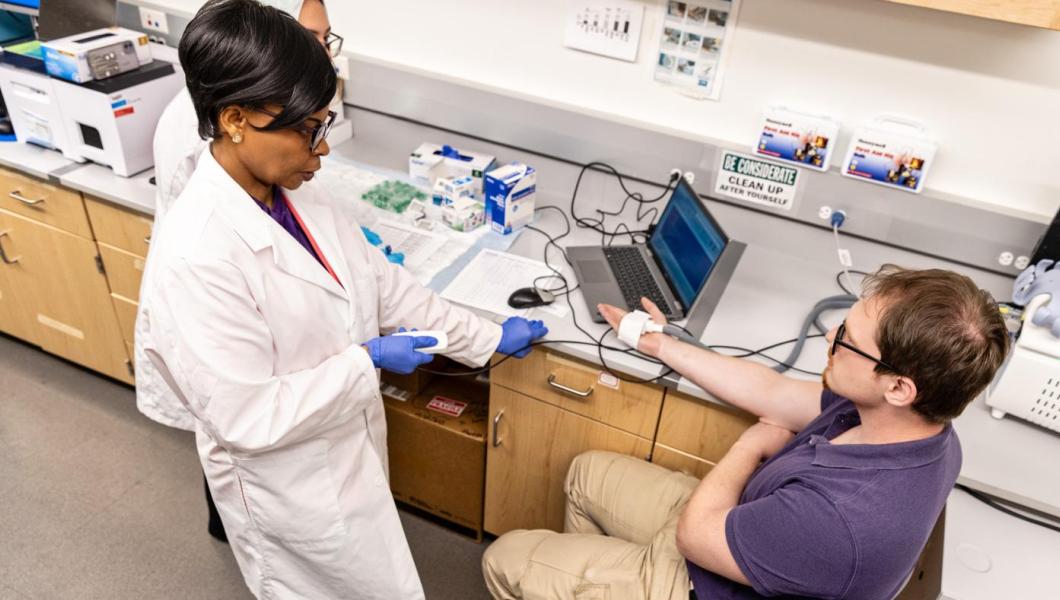A Pioneer in Brain Imaging Wins NJIT's 2024 Excellence in Research Award

Bharat Biswal, a pioneer in the field of neural imaging who developed a technique that sheds new light on brain-related diseases and injuries, is this year’s winner of NJIT’s Excellence in Research award.
In the early 1990s, as scientists began mapping the brain with functional MRI (fMRI), Biswal proposed a radical new approach to imaging: observing all of the regional networks at once while the patient sat still for several minutes.
“At the time, it was perceived as a crazy idea in neuroscience, which was focused on task and response,” recalled Biswal, then a graduate student at Wisconsin Medical Center and now a distinguished professor of biomedical engineering. “As an engineer, I wanted to understand the entire system of neural networks — and their connections — at baseline conditions. With one scan, we could observe activity in the motor, visual and speech regions, for example.”
Biswal was particularly interested in what the scans would reveal about brain-related diseases, such as where and how those brain’s regions connect and where the conversations falter. With those maladies, the brain may be compromised in several regions, so he thought that performing a particular task, such as solving a puzzle, wouldn’t be that useful.
Thirty years later, what is known as resting-state brain connectivity is the primary vehicle for examining brain connections in infants, very young, elderly and neurologically impaired people who can’t perform tasks on command. It is one of three required approaches in the National Institutes of Health’s Human Connectome Project.
His techniques are used to advance the knowledge, understanding, and treatment of many neurodegenerative diseases, brain injuries, and attentional, emotional and addictive cognitive states, as well as natural brain aging. He has written about brain connectivity in people with Parkinson’s, Alzheimer’s, Tourette syndrome, sleep apnea and chronic fatigue syndrome, among other conditions. His goal is to develop biomarkers for clinical neural diseases and ways to assess the efficacy of a variety of therapeutic interventions from pharmacological drugs to physical therapy.
Biswal, director of NJIT’s Center for Brain Imaging, is now using it to compare neural signaling in people with Alzheimer’s disease with those aging normally. He is zeroing in on the connections between the gray matter of the brain and the white matter.
“Alzheimer’s is particularly challenging because people can’t perform tasks and may forget right away what they have been asked to perform,” he noted. “We want to see which regions, such as memory or emotion, have been compromised — where connections are weak — and try to correlate that with clinical measures, including cognitive tests.”
A primary goal of the research is to apply fMRI for a more reliable diagnosis, prognosis and treatment of Alzheimer’s. The study is among the first to perform a comprehensive analysis of white matter function using fMRI and its effects on cognition in the two groups. His team is applying advanced analytic and machine learning approaches to identify white matter functional networks and to test the reliability of their findings using data gathered on the test subjects over time.
As part of his study, he’s collaborating with groups around the world to gather a vast and diverse data set of more than 100,000 subjects who’ve undergone fMRI scans. He’s observing the tests to ensure that testing methodologies and practices are as similar as possible. Small differences matter, such as whether people are instructed to close their eyes at one site and to keep them open at another. His team is working on a set of toolkits to track and explain the progression of Alzheimer’s to give clinicians a window into who might be at risk, for example, and to assess what therapies might be effective at different stages of the disease.
“We don’t just want to be able to diagnose it, but to help in assessing treatments,” he said. “We can see what happens when we try different therapies: How do the networks change? Do they look more like healthy ones?”
Biswal joined NJIT in 2012 as a tenured full professor and was promoted to distinguished professor in 2016. That same year, he was elected a fellow of the American Institute of Medical and Biological Engineering. He has received continuous extramural funding since joining NJIT of more than $8 million and has more than 48,000 citations, while his most-referenced paper received 10,548 citations.
Atam Dhawan, NJIT’s senior vice provost for research, said Biswal “exemplifies the qualities of a leader as a visionary in neuroscience.”
Quoting an eminent peer of Biswal’s in the field of brain imaging, he continued, “His achievements resonate well beyond individual studies. They have catalyzed a paradigm shift in our understanding of the resting human brain and its networks. This shift has opened new avenues for exploring the neural basis of human cognition and pathology, fundamentally altering how scientists and clinicians approach the study and treatment of neurological and psychiatric conditions.”
Biswal thanked the selection committee and senior administration at NJIT for choosing him for the award.
He added, “But I’m particularly grateful to all the undergraduate researchers who, in spite of their very busy schedules, still make time to do research and contribute very meaningful work, and to the graduate students, postdocs and colleagues who helped me in this research.”

